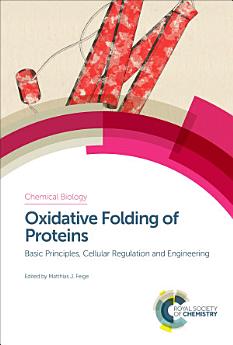Oxidative Folding of Proteins: Basic Principles, Cellular Regulation and Engineering
About this ebook
This book comprehensively covers the basic principles of disulphide bond formation in proteins and describes the enzymes involved in the correct oxidative folding of cysteine-containing proteins. The biotechnological and pharmaceutical relevance of proteins, their variants and synthetic replicates is continuously increasing. Consequently this book is an invaluable resource for protein chemists involved in realted research and production.
About the author
Matthias J. Feige studied biochemistry at the Swiss Federal Institute of Technology (ETH Zurich) and TUM. In 2009, he obtained his PhD in biochemistry under the supervision of Johannes Buchner at the TUM. As a postdoctoral fellow in the laboratory of Linda Hendershot at the St. Jude Children’s Research Hospital, Memphis, TN, USA, he expanded his research towards cell biology and since 2015 heads the laboratory for cellular protein biochemistry at the TUM. Matthias J Feige’s laboratory aims at understanding how cells control and maintain the integrity of their proteome. He is particularly interested in proteins of the secretory pathway - proteins that are ultimately secreted or localized on the cell surface and allow cells to interact with their environment. Using an interdisciplinary approach from protein biochemistry to cell biology he analyses the machinery and mechanisms that monitor cellular protein biogenesis. By focusing on proteins of immunological and biomedical relevance, he seeks a molecular understanding of fundamental biological processes that at the same time may help in developing new approaches for protein engineering and human therapy.







